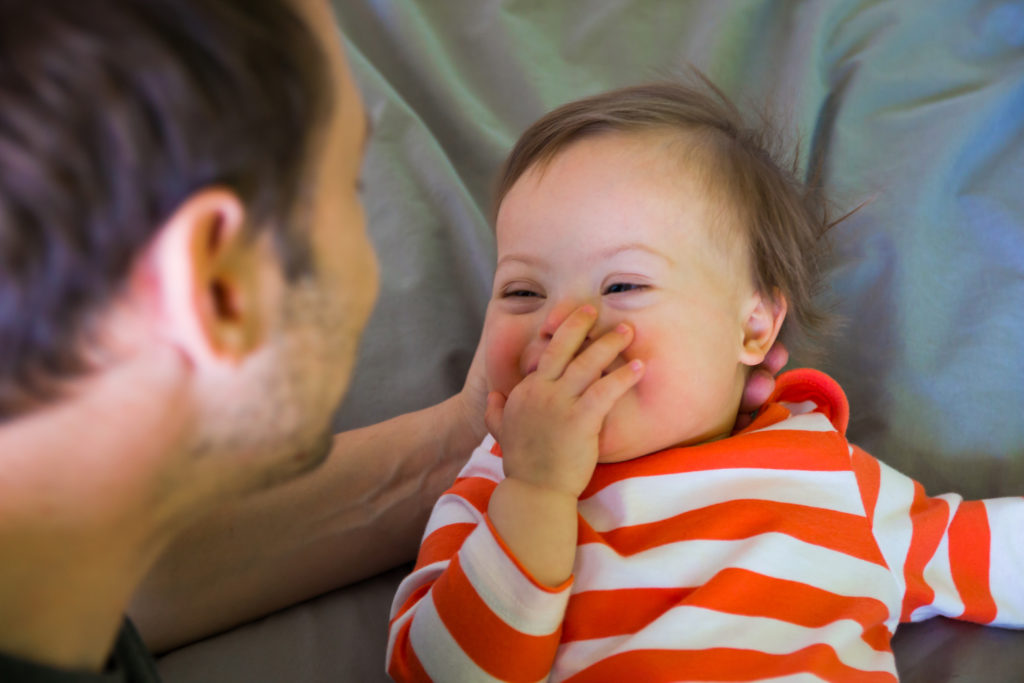Sleep apnea can impact anyone, but it is especially common among men, women, and children with Down syndrome. It can actually have a number of causes, some of which are neurological (the brain doesn’t send the right signals) and some of which are anatomical (the throat muscles become too relaxed). In this article, we’ll explore some of the reasons why those with Down syndrome are at especially high risk levels for sleep apnea; and, we’ll provide a few solutions for individuals with Down syndrome who are looking to get a better night’s sleep.
Why Are Children With Down Syndrome More At Risk?
First, just consider some of the statistics. According to the National Down Syndrome Society, there is a 50 to 100 percent higher rate of sleep apnea in individuals with Down syndrome. Among children with Down syndrome, sleep apnea occurs nearly six times out of 10.
There are several reasons why sleep apnea and Down syndrome tend to overlap. Anatomy plays a big part. Those with Down syndrome are more likely to have low muscle tone in the mouth and upper airway. They may also have constricted airways in the nose and throat. Enlarged tongues and tonsillar tissues are also common among individuals with Down syndrome, and may inhibit air flow.
What Is Obstructive Sleep Apnea?
If you have Down syndrome, or if you’re the parent of a child with Down syndrome, it’s important to be aware of some of the common signs of sleep apnea. Obstructive sleep apnea is defined by these characteristics:
- Loud snoring
- The feeling that you’re gasping for air as you sleep
- Waking up with a dry mouth or parched lips
- Headaches and fatigue in the morning
- Extreme daytime sleepiness
- Long periods in the night when you stop breathing (you’ll need a parent or sleep partner to tell you if this happens)
Obstructive sleep apnea is much more than an irritation; it can actually have highly consequential effects on overall health and wellness. Consider some of the ways in which sleep apnea can impact your life:
- You may feel chronically fatigued. Because you’re constantly waking up in the night, it’s impossible to get really deep, unimpeded, restorative sleep. As such, you may find yourself feeling physically tired and mentally drained throughout the day, to say nothing of short-tempered.
- Heart problems. Those who have sleep apnea often experience sudden drops in blood oxygen throughout the night, which can put strain on the cardiovascular system. The long-term impact is high blood pressure and an increased risk of heart disease.
- Increased insulin resistance. Also note that sleep apnea increases the risk of insulin resistance, which puts individuals in a higher risk category for Type 2 diabetes as well as metabolic syndrome.

Tips For Overcoming Sleep Challenges
While sleep apnea is undoubtedly a serious condition, there are some practical steps to help ensure a better night’s rest.
Make Sure You Have a Comfortable Sleep Environment
First things first: Position yourself for a good night’s rest by creating the right kind of environment. That starts with having a clean, clutter-free room; keep in mind that untidiness and chaos can sometimes induce stress and make it harder to fall asleep. Be sure to set the right temperature, as well; generally, cooler room temperatures make it easier to fall asleep. The breeze of a box fan may also help circulate air, plus provide soothing white noise.
Also be sure you have a good, comfortable mattress, one that’s well-suited for your preferred sleeping position. Parents can search for the best mattress for their Down syndrome child, finding something that’s a comfortable, supportive, and budget-friendly mattress for children.
Choose the Right Sleeping Position
For those with sleep apnea, the safest sleeping positions are on the side, or on the stomach. As The Mayo Clinic notes, sleeping on your back may cause your tongue and soft palate to rest against the back of the throat, which may obstruct the airway and contribute to sleep apnea. If you do want to sleep on your back, make sure you use an adjustable bed frame or some study pillows to keep the head elevated. And if you have a hard time staying on your side or stomach, use pillows to hold you in place.
Get a CPAP Machine
A continuous positive airway pressure (CPAP) machine involves a mask that you wear on your face, which pressurizes the air to a slightly higher level than the air in the room. This effectively pushes more oxygen into your airways and forces them to remain open. You’ll need to talk to your doctor, but for those with moderate to extreme sleep apnea, a CPAP machine can really be a game changer.
Develop a Relaxing Bedtime Routine
The right routine can help anyone who battles insomnia, whether due to sleep apnea or something else. There’s not one right way to accomplish this. The important thing is just to develop some evening rituals that help you to relax and unwind. Some examples include taking a soothing bath, doing a little light yoga, or curling up with some scented candles and a good book. (One thing to avoid is screen time; the blue light emitted from your electronic devices can actually throw off your body’s natural sleep cycle.)
Stay Fit
Even a little bit of extra weight can constrict your throat and make it harder for you to maintain healthy breathing. Some weight loss may yield major dividends for your sleep apnea. What’s more, a little daily exercise can help prepare your body for rest.
Final Thoughts
Those with Down syndrome often experience a hard time sleeping. That’s especially true among children. Thankfully, with the right approach, you can minimize the disruptions caused by sleep apnea, and help promote a better night’s rest.

